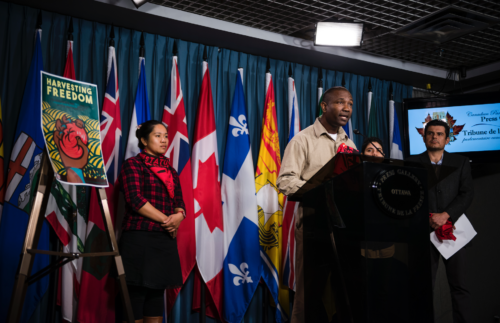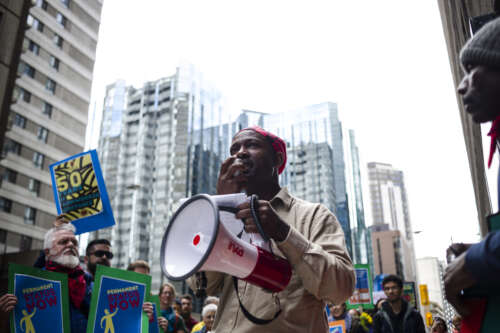The University of Guelph has named Gabriel Allahdua its first activist-in-residence, a role based at the Grounded and Engagement Theory Lab (GET Lab) in the College of Arts.
Allahdua, a longtime advocate with Justice for Migrant Workers, will bring his knowledge and experience of farm worker issues and his organizing skills to the role, designed to connect activists with academic researchers.
The activist-in-residence position is new to the University of Guelph and one of only a handful in all of Canada. Merging academia and activism in other disciplines is not new. However, “it is unique to political theorists and political philosophers and is another reason for the development of the GET Lab,” said Dr. Candace Johnson, professor in the Department of Political Science.
Grounded and engaged theory at U of G

Dr. Monique Deveaux, professor in the College of Arts, co-founded and co-directs the GET Lab with Johnson. The lab, established in 2022, encourages the use of empirical research methodologies and socially engaged studies to ground normative theorizing in people’s lived experiences, better illuminating and supporting communities’ struggle for social justice.
“It’s an emerging approach in our areas of study, and our goal is to advance it,” said Deveaux, whose established connections with international colleagues working in engaged theory served as the impetus for the lab’s creation.
“We hope to foster community, knowledge sharing and research collaboration by engaging in research methods that centre the voices of members of justice-seeking communities,” Deveaux said.
“In our case, the theory is generated from empirical work, from engagement with activists and communities,” Johnson explained. “In our research, we’re really interested in those foundational questions concerning justice or solidarity or citizenship or rights.”
Scholars are driven by ideas, Johnson said, but without meaningful engagement in pertinent communities, research can be limited. This new position is about recognizing that activists are theorists as well, she said.
Allahdua will visit classes, give public talks and help organize a conference on justice for migrant workers as well as connect the GET Lab to his own network of Ontario-based migrant worker justice organizations. “We want him to invite his colleagues to campus for talks and workshops to really raise awareness of the vulnerability of migrant workers in Canada,” said Deveaux.
Guelph and the connection to agriculture

Allahdua, a former beekeeper from St. Lucia, said to be in the presence of people studying agriculture – the “future farmers” as he calls them – “is a powerful opportunity” to make people aware of the human toll involved with growing the food that ends up on our plates.
“We’re all connected by food,” Allahdua said. “Around the world, Guelph is known for agriculture, and the vulnerabilities that migrant farm workers face are tied to agriculture.”
In 2012, Allahdua came to Canada under the federal Temporary Foreign Workers Program and went on to work four seasons on a Leamington, Ont., farm before devoting his time to activism. Born and raised in the rural Mabouya Valley in St. Lucia, he received a diploma in general agriculture from the Guyana School of Agriculture.
In future, the activist-in-residence program may focus on a different issue, Deveaux said, but “the idea is to put our research to work and move the dial on issues of injustice.”
The position is funded by the Canada Research Chairs Program, the College of Arts, the Community Engaged Scholarship Institute, the dean of the College of Social and Applied Human Sciences, and the Department of Political Science.
Contact:
Dr. Monique Deveaux
mdeveaux@uoguelph.ca
